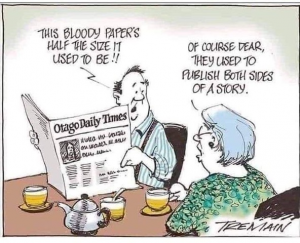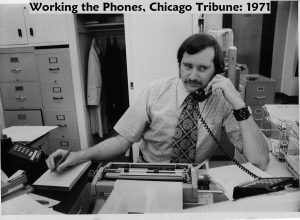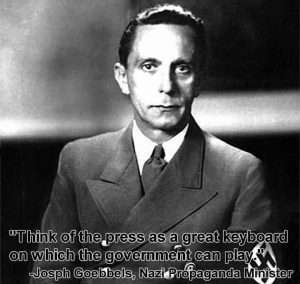I spent 28 years as a reporter and foreign correspondent for the Chicago Tribune. It was a great career—one that I’m proud of.
I won my share of major journalism awards and was nominated a couple of times for a Pulitzer Prize.
But prizes or, for that matter, money was not the reason I became a journalist.
I considered journalism a calling. Okay, not a calling like a priest, a teacher, or an artist. But when I studied journalism at the William Allen White School of Journalism at the University of Kansas, I felt a deep alignment between myself and a journalist’s important work.
Journalism and a free press are critical to maintaining our republic by providing accurate and unbiased news so citizens can make informed decisions about their lives, their government, and their families.
Sadly, I don’t think that is the case today. Journalism today seems more intent on providing propaganda than impartial news.
That is not just me talking. A Gallup and Knight Foundation report published two years ago entitled: American Views 2020: Trust, Media, and Democracy showed a widening gulf between American aspirations for and assessments of the news media.
Gallup &Knight Foundation polled more than 20,000 U.S. adults and found continued pessimism and further partisan entrenchment about how the news media delivers on its democratic mandate for factual, trustworthy information. Many Americans feel the media’s critical role in informing and holding those in power accountable is compromised by increasing bias.
Reporters, the report said, have decided that just reporting the news accurately without bias or favor is no longer enough. Many have decided that it is their job to persuade readers and viewers to adopt viewpoints that coincide with theirs or those of a certain political party or belief.
That is not the way I learned how to practice journalism.
In short, today’s journalism is NOT MY NEWS MEDIA—or at least not the news media I cut my teeth on.
Maybe a little historical context is in order, and what better way to provide that than by looking at my own background in the news business.
I was offered a reporting job at the Chicago Tribune immediately after earning my journalism degree at the University of Kansas in 1969. Needless to say, I was enthusiastic, if not a little bit anxious and nervous about going to work for one of the nation’s top four newspapers in the most competitive newspaper city in the country. After all, I was a rank novice.
I survived those jitters and spent almost five years covering the streets of Chicago, including police, crime, courts, city and state politics, social issues, catastrophes, and anything else I was asked to cover, including visits to the city morgue. I worked terrible hours, including 5 p.m. to 1 a.m. and 9 p.m. to 5 a.m. Eventually, after paying my dues, the Tribune put me on a normal 9 to 5 daytime schedule.
Journalism in Chicago at that time was fiercely competitive. No matter what story you were working on, chances were reporters from the Chicago Sun-Times, the Chicago Daily News, or Chicago Today were covering it too—not to mention several television and radio stations, City News Bureau, the Chicago Defender, and a handful of suburban newspapers.
Add to that the relentless pressure of meeting deadlines, beating your competition, and dealing with demanding crabby editors, and you have some idea how I learned to be a reporter.
It was the best training ground a reporter could have. And I loved every minute of it!
As I entered my fifth year at the Tribune, I guess I was doing something right because I was offered the post as the paper’s Far Eastern Correspondent based in Tokyo.
Being a foreign correspondent is about the highest form of trust a news organization can bestow on a reporter. It says you have shown an ability to report and write every kind of story with speed, completeness, and accuracy. It also says the organization trusts you to represent it ethically, competently, and favorably no matter what country or story you are covering.
As a foreign correspondent, I endeavored to provide unbiased and evenhanded stories even as I covered the horrors of war and revolution in Vietnam, Cambodia, El Salvador, and Guatemala—not to mention uprisings in places like South Korea and Tiananmen Square in Beijing.
When it came to voicing my opinions, I did so in the Tribune’s Perspective section, which was devoted to opinion—not in my news stories. If I was angry or troubled or saddened by an event I had covered, I vented in a clearly labeled opinion piece.
That is NOT what I see happening today. Today, I see reporters attacking and demeaning those they disagree with on-air and in stories that Nazi propaganda minister Dr. Joseph Goebbels would have praised during World War II.
When not doing that, reporters are refusing to cover stories that they differ with or dispute without doing the legwork to determine a story’s legitimacy.
There are two recent stories I can point to today that fit that profile: The Hunter Biden scandal and its connection to president Joe Biden and Rep. Eric Swalwell’s disturbing sexual relationship with an alleged Chinese spy named Fang Fang.
Neither of these stories received coverage of any significance in the mainstream media during the 2020 presidential election and thereafter. Why not?
According to the Gallup report, it’s because of political bias or a conscious decision to ignore stories that didn’t agree with the predisposition or views of the news organization or a deliberate desire to shield the Democrat Party which 90 percent of America’s journalists belong to or support.
Today, some mainstream media outlets (the New York Times, Washington Post, CNN) have issued mea culpas because of their bias of omission or outright refusal to run any hostile story about Joe Biden. Why? Because even the corrupt mainstream media can no longer ignore the FBI and Department of Justice investigations into the Biden crime family.
That is NOT the way I learned journalism. Reporters should report stories without fear or favor and let the chips fall where they may. Their job is not to protect a like-minded politician or political party, nor is it to attack those with an opposing view or political philosophy.
Clearly, in too many cases, that is not happening today.
In fact, things have gotten so bad, that I would suggest a new award for those journalists who persist in biased and one-sided reporting: The Joseph Goebbels Prize for Deceptive and Distorted Reportage.
Regrettably, it’s a prize that too many journalists today deserve to win.







To quote Sam Smith, “The greatest power of the mass media is the power to ignore.” Further to your excellent idea of the Joseph Goebbels Prize, maybe a special award for the print media could be called the Walter Duranty Prize.
Great idea, J.C. Duranty’s Pulitizer should have been returned decades ago when he was apologizing for Stalin who apparently is Putin’s exemplar.
It is amazing that after the New York Times, Washington Post, and CNN came out with some mention of the Biden crime family, the leftists all cried, “Unfair media attacks..” There is no point in raising an opposing view with the left, so I just had to chuckle. Calling those sycophantic rags unfair points out that the progressive left will even attack their supporters if they say one word of criticism aimed at the incompetent administration.
I hate to admit it, but my old profession has become a disgrace. When I tell folks I spent 28 years toiling as a journalist, I have the distinct feeling that they view me as one of those unethical and devious salesmen who once prowled the nation’s used car lots. Today, I am sad to say, being a used car salesman is a more honorable profession than being a reporter.
Empathy here, Ron. My old profession has also fallen under the shadow of disgrace. I spent decades not being able to talk about my work; now that I can (a bit), too many of my younger colleagues have shifted priorities from focusing on our country’s international enemies to targeting fellow citizens, and I don’t want to be judged guilty by association.